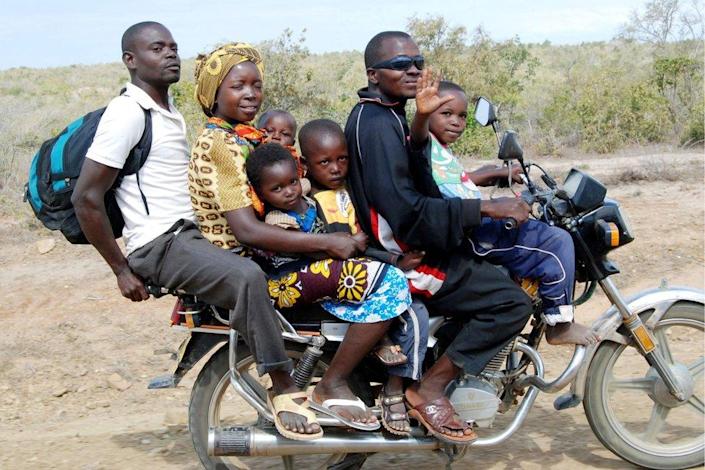
In our series of letters from African writers, Kenyan broadcaster Waihiga Mwaura reflects on the latest outrage allegedly carried out by riders of motorbike taxis and asks why it seems so difficult to take action against them.


Anyone driving in Kenya’s capital knows they have to be aware of the motorbike taxis – known here as boda-bodas.
First you might hear the buzz of the engine change pitch as the driver accelerates, then maybe you spot something in the mirror – the familiar glow of the hi-viz jacket or a bright yellow helmet. And then suddenly they’re around you – close to the side of your car, darting in front, crossing your path.
Any knock to your car and they might be gone before you can challenge them – or worse still, there could be a confrontation.
It is said to be a dispute after an accident and connected assault on a female car driver which resulted in the latest round of condemnation of the so-called boda-boda menace.
A widely-seen video of the incident shows the woman screaming for help as she was stripped of her clothes and groped.
There have been arrests, condemnation and calls for action to better regulate the boda-boda industry.
Yet in two ways this is a case of déjà vu. First in the response to violence against women and second in the government’s determination to do something about the motorbikes.
The fact that the assault happened shortly before International Women’s Day served as a reminder that women still do not feel safe in this city.
There was a march on Tuesday with women holding signs with slogans such as “hear me scream”.


But this wasn’t the first time that such a well-documented attack had happened.
Back in 2014 protesters gathered in Nairobi to rally in support of a women who was attacked and stripped by a group of men reportedly because she was wearing a mini-skirt.
The demonstration saw thousands of women march behind a banner proclaiming: “My dress my choice”.
Six years later a minibus taxi driver and his conductor were sentenced to death for the assault.
But this outrage is often confined only to those incidents caught on camera – of course, there are many off camera, which do not go viral and remain unspoken of.
Indeed, it seems the police only swung into action once the video had generated indignation – three days after the attack.
This apparent delay could explain the feeling that some women have that complaints to the authorities about assaults are either not taken seriously or not properly investigated.
And when it comes to doing something about the motorbike taxi industry, the politicians have publicly displayed familiar resolve.
President Uhuru Kenyatta has ordered a crackdown on all boda-boda operators countrywide.
And Interior Minister Fred Matiang’i proclaimed that “we must protect our roads from such vile and reprehensible acts of aggression”.


But two years ago he got a report from a taskforce set up to look at the industry and pledged action.
In August 2020 he set up the boda-boda information management system which was meant to keep records on all operators nationwide and thus inject some sanity into the industry.
What has happened to that?
And now he appears to be hinting at another taskforce, another set of resolutions to do something.
One of the difficulties is that, for many, boda-bodas are a convenient, fast and cheap way to get around. They provide a vital service to customers as well as employment to thousands of young men.
Nevertheless, as the National Crime Research Centre revealed last month, they’re also a grave danger on the roads and quite a few riders are involved in robbery with violence, drug trafficking and even murder.
As well as a nationwide database, its report recommended refresher training and testing for the drivers.
There is also the model that neighbouring Rwanda has adopted, where every licensed driver is issued with a GPS trackable smart meter.
And yet we are still in this situation.
The problem of violence against women and the problem with the motorcycle taxi industry are well known.
Surely the time for hand-wringing is over and it is time to act.
But I’m afraid that we will have to wait. For now I hope that the woman who was attacked is being supported by people who love her and can help her through what must be a very trying time.
More Letters from Africa:
Follow us on Twitter @BBCAfrica, on Facebook at BBC Africa or on Instagram at bbcafrica






